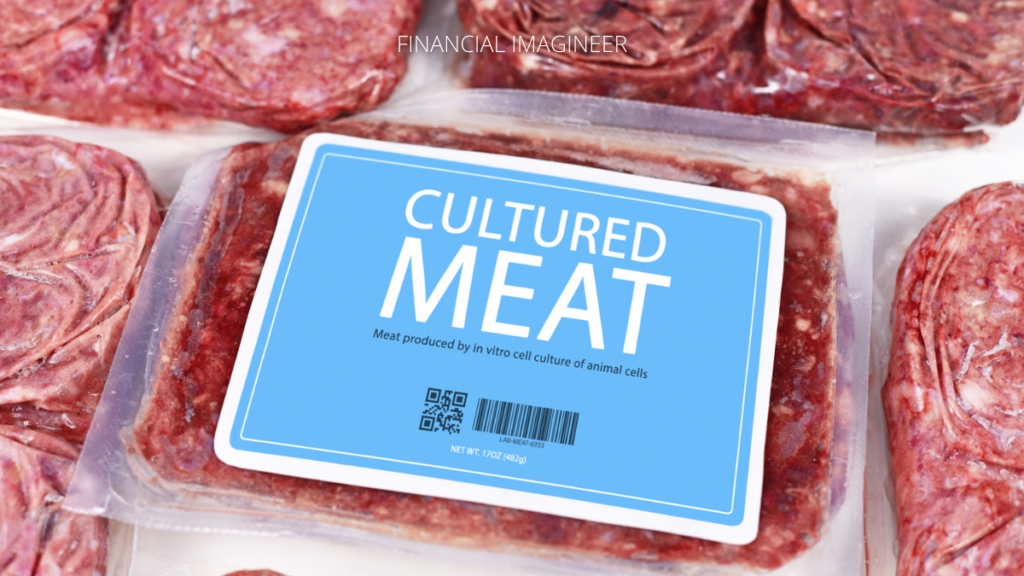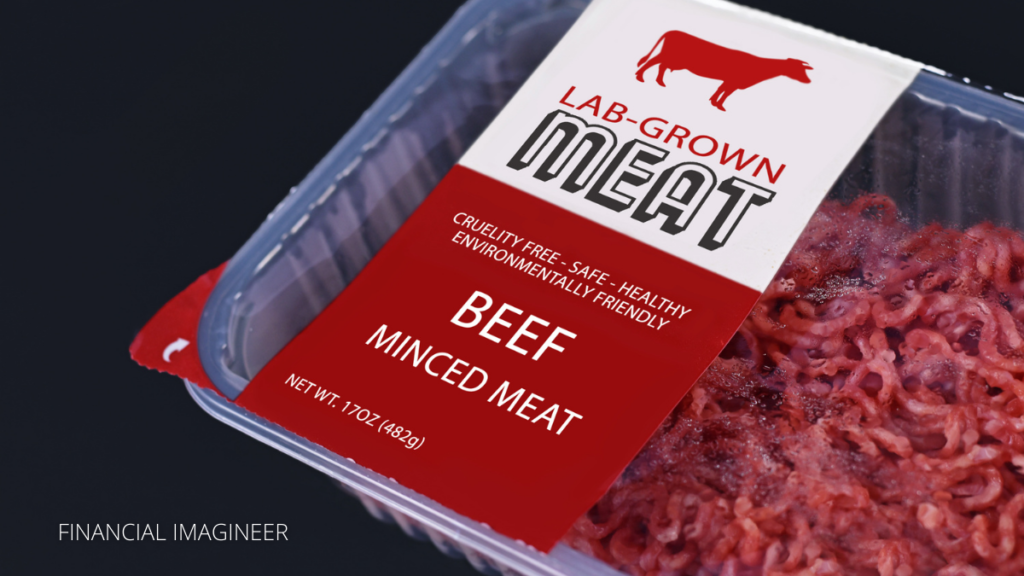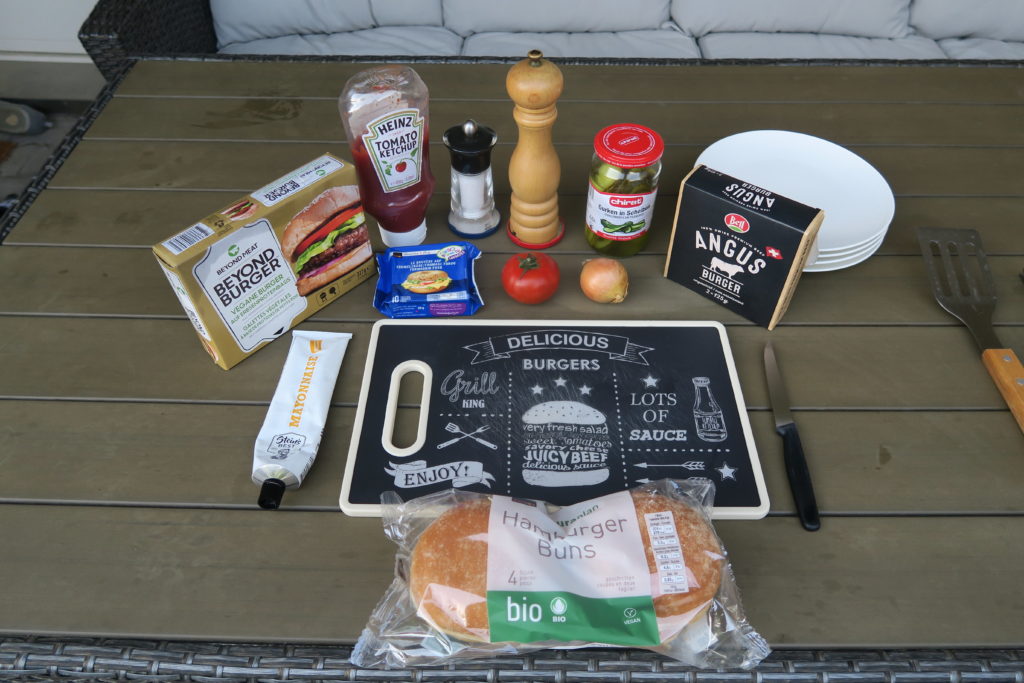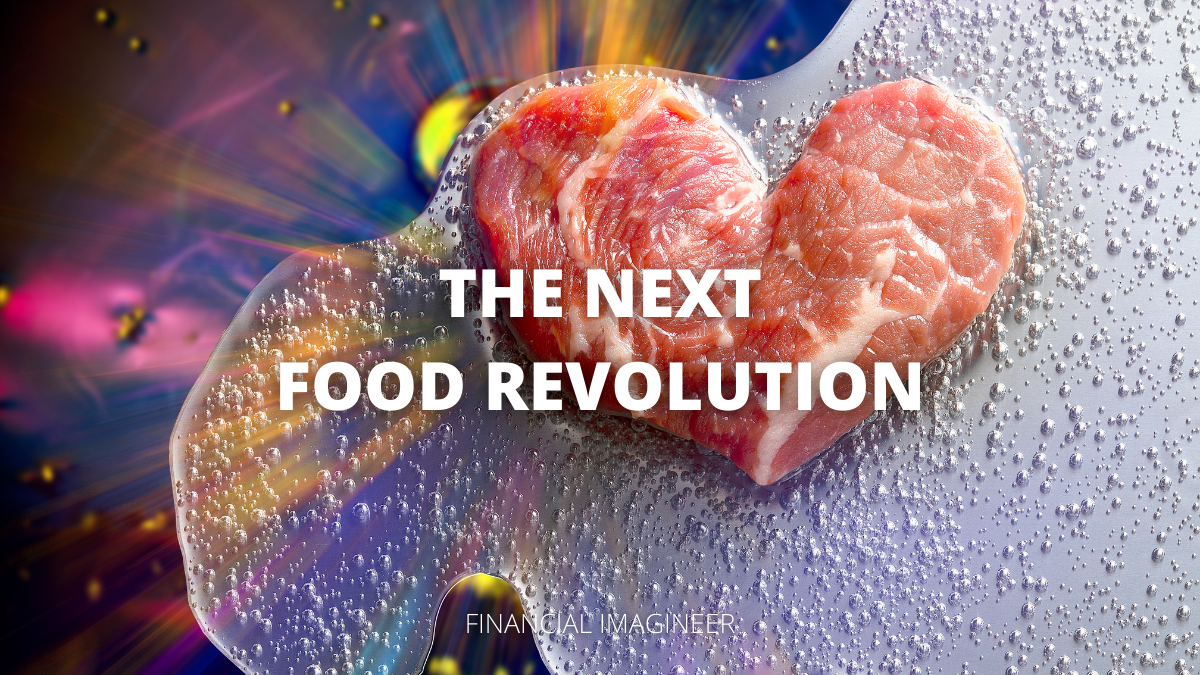The next food revolution is coming, and it will be bigger than the organic or gluten-free explosion or anything else you may have experienced in the the past. The meat industry is on the verge of a major disruption with artificial meats and meat replacement options entering the markets.
There are many startups working on meat replacement like Beyond Meat or Impossible Foods who make plant-based burgers that look, cook, and even “bleed” like real meat. These companies are changing how consumers think about their food choices as well as opening up opportunities for investors looking at new technology products.
But the industry is not just working on “veggie-meat”, the world’s first laboratory-grown hamburger with real meat was grown, cooked and eaten by two volunteers back in 2013 in London. The patty was created from stem cells taken from a cow and grown in a lab for three months before being mixed with other ingredients to create an approximate beef taste and texture.

Countries like China are taking steps to ban animal-based meats by 2030 due to environmental concerns, and many Americans are ditching meat for ethical reasons as well. In this article we’ll discuss how believe this transition will work out and how you can position yourself to profit from this change now – before it’s too late!
As a species we have evolved to be able to digest meat at one point. Human evolution started to fast-track once humans increased ther meat intake, especially the brain evolved faster.
For extended periods of time eating meat has been mainly a luxury reserved for the wealthy. As economic advancements and the industrial revolution made it affordable to a broader segment of the population it became more widely spread. The idea of mass-production made it possible to produce meat in high volumes which is regarded as the ultimate sign of economic progress.
We identify feeling wealthy, being at the top of the foodchain and having unlimited access to great nutrition, taste, flavour and enjoyment with eating meat, the crown of human development.
Disruption Ahead
Human progress for better nutrition didn’t stop at the industrial revolution, the next disruption is well ahead to better and healthier food is well on its way. What we are now witnessing is the beginning of an artificial meat-revolution that will drive up change across all industries: agriculture, restaurants, retail companies and so forth. This is just one of more disruptions that will shake up this decade, read more here.
The meat industry is getting disrupted by several factors simultaneously. Let’s explore the top five reasons why people would consider to switch to new sources for nutritions first.
1. Do Something Good
A lot of people decide to switch from a meat heavy diet simply because they want to do something good. This may be doing something good for themselves, for the planet and for the animals.
One of my favorite quotes about food and feeding people comes from Nobel Prize Laureate Dr Norman Borlaug who said “We need new technology to feed an exploding world population with finite resources.”
Technology has always been at the heart of what we do in farming. The good news is, reducing your meat consumption is no longer the only way to do something good: There’s a whole new industry with substitute options for all of us coming, and believe me, it’s growing fast!
2. Concerns about not Harming Animals
A majority of people turning to vegetarian alternatives is doing so because they find it unethical or inconvenient to kill animals for food. By having substitute products available, even more people might want to explore going meatless as they could avoid supporting the animal industry. The ethical argument is the most widely spread and compelling, but there are even more arguments.
3. Climate change / Concerns about Global Warming
There is a lot of research about meat and the environment and how both are connected. Did you know animal farming is one of the biggest threats to our environment? The livestock industry produces 14% of our global greenhouse gas emissions – which is as much as cars, trains, planes and so forth combined!
A lot of people want to do something good for the environment, if we shift our diets away from foods derived from livestock agriculture and increase plant-based proteins, like soybeans and nuts – which require far less water to produce than meat – we would see a significant reduction in our environmental footprint.
Particularly thanks to the rapid growth of China’s middle class there’s been a incredibly fast growing appetite for more proteins and the government of China itself recently advised people on how they can reduce their meat consumption and adopt more plant-based diets as an effective way in achieving sustainable development goals by 2030.
4. Health Reasons
This is mostly still an overlooked reason but arguably it might turn into the most important driver to fuel the trend. Health risks of animal products such as red and processed meats cause cancer, animal protein contributing to obesity, heart disease and diabetes have been all over the news for some time. Most well educated people are aware consuming meat can have health issues.
Designing new, better and healthier food solutions will be the ultimate upside here to shift consumer demand. Imagine how interesting new, convenient and healthy solutions could become for fast-food operators.
With more people becoming conscious of what they eat on a daily basis, the importance and significance of this driver is growing larger.
5. Human Curiosity
The more such products are becoming widely available in supermarkets and restaurants, the more curious people will eventually become and explore the new items on the menu. This will reach mainstream at some point.
As a new food revolution is taking place, it will be up to the next generation of entrepreneurs and investors who are aware that shifting away from meat doesn’t happen overnight but rather through a transition period.
What Exactly are Meat Replacements?
What is meat replacement (meat), what is artificial meat (as opposed to plant-based) and how will “the market itself be changing?”.
The current goal of meat replacements is to give people the same satisfaction as animal-based meats while not affecting the environment negatively.
Meat replacements come in two forms, the first and more common one is another form of plant-based proteins that aim to replicate the taste and texture of animal based meats like beef, chicken or pork – but without eating animals. These products can be made from soy beans, wheat gluten, pea protein isolate etc., which could give you a wide range of flavors.
The second form of meat replacements are lab grown meats which are made by using cells from animals that can be cultured in a carefully controlled setting instead of hunted for or taken from livestock raising farms. For now this second form is still too expensive, but ongoing research might help bringing down costs as well. In Singapore there is a first restaurant where you can enjoy lab grown chicken nuggets as of 2021.

Artificial Meat Economics
Can artifical meat replace the whole market? The answer is not a simple yes or no. There will be some substitutes, but the market for meat replacements will not replace 100% of the market anytime soon for sure. For example if you compare beef with chicken we have different tastes and needs for each type of meat so that means there cannot be just one substitute which covers all types
Some people may still want the taste experience from eating an actual steak or burger. While a complete switchover will not happen, there will be a gradual shift for sure.
Imagine, currently the global meat market is valued at $1,700 billion (annual turnover). Currently, the meat replacement market is still rather niche with around $2-3 billion annually. If we just believe the substitute market grows to 10% of the current meat market, we’re already talking about 50x growth! This is what’s expected to happen over the next 10 years. 50x!
Such growth rates can be incredibly interesting for investors.
Opportunities Ahead
The most interesting part of the new food revolution will be branding. Currently, if you buy meat, you buy a steak, a chicken or simply a piece of meat. Going forward, you’ll be buying a branded product instead. This is the number one opportunity for business right here: Branding on meat (-replacements)!
The industry needs to understand what customers want so they can provide it for them in a way that satisfies most of their cravings. We may not be able to completely replicate the taste and texture of real meat, but we can successfully replace it with something that satisfies most people for sure. Artificial meat may even be engineered with health benefits over natural meat.
Innovation and research will be key in this space. It’s not just Beyond Meat or Impossible Foods that are working on food solutions for tomorrow, even some of the largest nutrition companies on this planet like Nestlé have currently around 10% of their R&D workforce working on new solutions and projects in this field.

The opportunities will be truly infinite. Nestlé already got artifical tuna, seafood and fish will be next, to be followed by eggs, milk and dietary replacement products. There lies huge potential in this field and we are only at the beginning.
That’s why I believe investing in artificial meat or more broadly food companies will be a highly lucrative long term investment opportunity if you know how. Engineered protein nutrition could replace up to 30% of all global meat consumption within ten years!
How Does it Taste?
Yes, we’ve tried.
My kids couldn’t tell the difference between Angus Beef Burgers and Beyond Burger, they actually favoured the meat replacement over the real deal. We also cooked spaghetti bolognese with Beyond Mince. It was not the very same, but rather tasty as well.

For now, the best things to cook with meat replacement products are meals where meat is not the dominating or featured main ingredient.
Imagine if they manage to change this one as well one day!
I believe a food revolution is coming. The world population will increase by two billion people in the next 35 years and we need to find new solutions to feed everyone, use less land, water and antibiotics and take care of our animals.
By understanding these trends early we’re able identify investment opportunities that others might miss out on while also helping investors understand what’s driving them. That’s why I’ve written “The Next Food Revolution”.
What do you think about meat replacement?
Have you tried meat replacements yourself yet?
How did you like it? Any favourite recipies?
Would you like me to post a recipe with some of my favourite recipes for meat replacements in it too? I’ve seen one or two but not many. Is this something that would be interesting to people interested in following along? Let me know!
What do I like the most about this topic?
Nothing seems impossible!

Keep your impossibility mindset and imagineer your own life!
To get access to more blogposts, insights and other resources on investing in the next food revolution please subscribe by email below, follow on Facebook, Twitter, or reach out directly here for more.
Stay ahead!
Matt
